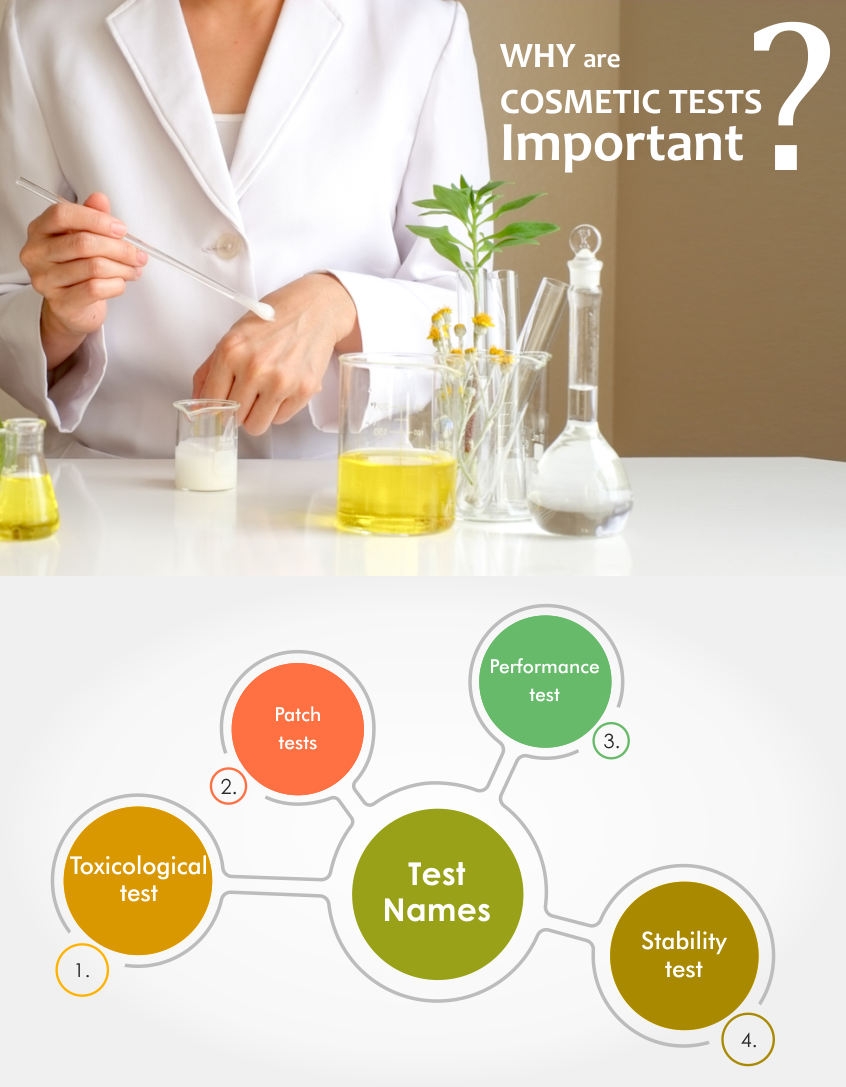What Are the Product Tests Required for Cosmetics ?

When it comes to cosmetics, one of the most pressing issues for legal authorities, consumers, and producers is product safety. Our cosmetics are in direct contact with our skin. This implies they can injure our skin if they contain any unpleasant or harmful ingredients.
Indeed, it is the obligation of producers to ensure that each product offered is safe for customers. It also influences the reputation of the business and the quality of its products. Customers want the products they purchase to be efficient and comply with their specifications. The higher the perceived quality, the better the brand image and sales.
WHY ARE COSMETIC TESTS IMPORTANT?
Product testing ensures that the substance or raw materials used in cosmetics are neither hazardous nor dangerous to the users. Cosmetic quality control is critical to ensuring the safety and efficacy of items and their raw ingredients.
Cosmetic materials are dermatologically examined, which means that they have been evaluated on human skin and the resulting product has been determined to be safe to apply to the skin. Moving ahead, several cosmetic tests are being conducted to assure the safety of the items.

- A Toxicological test (safety test) is being performed to guarantee that the items and their solvents do not cause harm to consumers when used.
- Patch tests are used to determine how a particular product reacts when it comes in direct contact with the skin.
- Product testing is also performed to guarantee that the items are genuine and that they perform the tasks and objectives that they promise to do. This is accomplished through a test called the Performance test.
- Product testing includes a Stability test. This is done to guarantee that the product's functions, as well as its physical and chemical properties, are maintained during its shelf life, regardless of changing environmental conditions.
As a result, these are some of the reasons why cosmetic product testing is necessary.
Lab testing for cosmetic items is an important element to consider. There are several cosmetic product testing laboratories in the nation. The primary goal of laboratory testing is to guarantee and confirm that the new cosmetic product has the required physical and chemical composition. It also checks the product's quality standards. See : https://www.pureoilsindia.com/custom-formulation
WHO IS RESPONSIBLE FOR THE SAFETY OF COSMETICS?
Other than color additives, the FDA does not have the legal control to approve cosmetic items and ingredients before they are placed on the market. We also do not have a list of the tests that must be performed on every specific cosmetic product or component.
A cosmetics producer or distributor, on the other hand, is legally responsible for ensuring that a marketed product is safe when customers use it as per the guidelines on the labeling or in the customary or anticipated manner.
If we have solid evidence that a cosmetic does not fulfill the legal criteria for safety, the FDA can take action against the maker of the cosmetic on the market. Color additives are treated differently under the law. Color additives, with the exception of coloring elements used in coal-tar hair colors must be authorized by the FDA for the specific intended application before they may be used in any product.
COSMETIC PRODUCT TESTING LABS IN INDIA
In India, we have several great product testing facilities. These laboratories conduct cosmetic product testing to ensure that the cosmetics fulfill consumer safety standards. The following are some of the product testing laboratories in India:
- Gujarat Laboratory
- Arbo pharmaceuticals
- RCA laboratories
WHAT IS CDSCO?
The CDSCO (Central Drugs Standard Control Organization) defines a cosmetic as a specific product that individuals can apply to their skin for cleansing, rejuvenating, or enhancing their look. Color additives used in cosmetics and pharmaceuticals in India must be approved by the CDSCO.
Cosmetics must be properly labeled and must not be adulterated or misbranded in any way. However, you are legally liable if you create harmful or incorrectly labeled items. The license is granted once the items are found to be sufficiently safe.
DOES NATURAL MEAN SAFE?
Choosing products from sources labeled "organic" or "natural" by the manufacturer is no assurance that they are safe. Manufacturers are still responsible for ensuring that their goods are safe when used as per the instructions on the labeling or in the usual or anticipated manner. Some more testing may be required.
You May Also Like:
